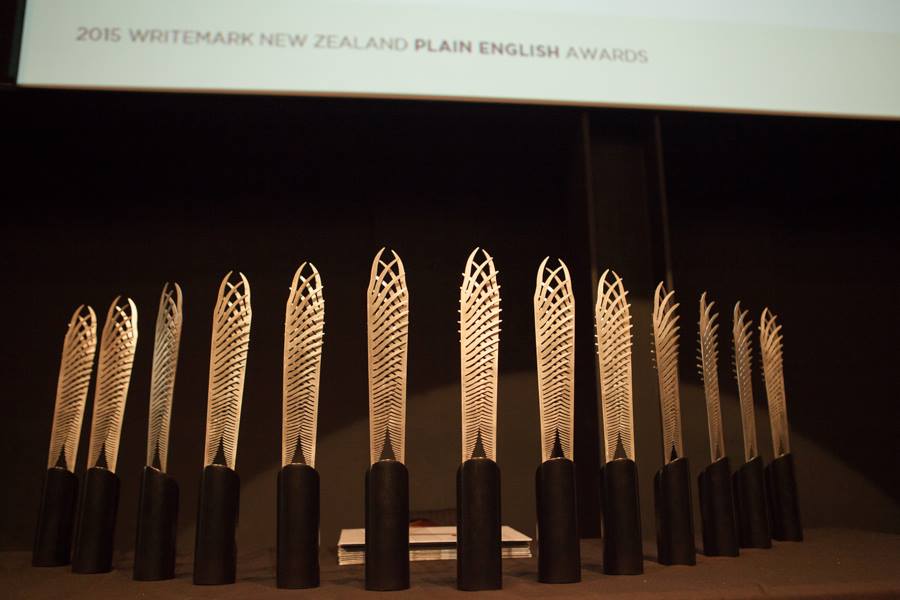
Taking a fresh approach to legal writing with the Best Plain English Legal Document
Legal documents are changing. Once densely written, peppered with Latin, and strictly formatted, today’s legal documents are much more reader-friendly.
We’re all readers of legal documents. And we all appreciate clearly written documents that state the necessary information without resorting to legalese. Preferably, we want to be able to read the document and understand it easily. This means we can discuss the content with our legal advisor or a colleague, without having to rely on someone else to explain it first.
A fresh approach to legal
When we’re signing a contract, entering an agreement, or deciding who we’ll leave our worldly goods to, legal documents in plain English make each party’s obligations clear.
The Best Plain English Legal Document award recognises this fresh approach to legal documents. The judges will be looking for examples of legal writing that consider the reader’s needs rather than the writer’s. These are the documents that clearly and succinctly explain, streamline, and structure legal content that could otherwise be confusing to a non-legally-trained person.
Here’s what the judges praised in last year’s winner and finalist entries.
About the Contract and Commercial Law Act 2017 (Parliamentary Counsel Office)
Parliamentary Counsel Office did a great job of combining multiple Acts that were a confusing hodgepodge of legislation into a single intelligible Act.
A clear understanding of the audience and consultation with these groups made the project stronger. The explanations in the legislation were particularly useful.
The revised Act is a great step forward in New Zealand for plain English legislation. And the intended audience has a much clearer picture of contractual law in New Zealand.
About the Property Sharing Agreement (Cavell Leitch)
Cavell Leitch has shown a commitment to improving the clarity of a consumer-focused contract. Significant steps have been taken to improve the language.
The judges are looking forward to seeing what this year’s entries will bring.
Enter your fresh legal document here
Anne-Marie Chisnall August 29th, 2018
Posted In: 2018 Plain English Awards, Legal writing
Tags: Best Legal Document, clarity, Legal writing, legalese, recognition

It only takes a sentence to enter the Awards! Get transforming, using these simple steps.
Have you ever wondered what it would be like to enter an awards competition? The award for Best Plain English Sentence Transformation makes entering the Plain English Awards as simple as 1 – 2 – 3!
1. First, catch your sentence
Complex, long-winded sentences abound in official publications, on business websites, and around the office.
To find a suitable sentence, first of all, track down something that’s really long with multiple clauses, that maybe even includes more than one main idea, and also uses unnecessary, surplus words and phrases and convoluted language, which nevertheless might be regarded by some as adding a certain element of essential formality. See what we did there?
2. Rewrite your sentence in plain English
Rewrite your sentence in plain English so that it becomes simple and beautifully crafted. Keep your sentence short. If needed, you can use more than one sentence to express the ideas of your original text.
3. Enter your sentence in the award for Best Plain English Sentence Transformation
Enter your original and rewrite in the category that gives well-written sentences the attention they deserve. You can enter up to three sentence transformations in one entry. And feel free to enter more than once!
Enter the Best Plain English Sentence Transformation award
Check out last year’s winner here
Check out one of last year’s finalists here
And check out the other finalist from last year here
Anne-Marie Chisnall August 29th, 2018
Posted In: 2018 Plain English Awards
Tags: 2018 Plain English Awards, Best Plain English Sentence Transformation, clear communication, entry, recognition, sentence, transformation

So often we hear stories about the people behind a plain English initiative in an organisation. To make sure these people get their own time to shine, we’ve got a Champion award — for the Best Individual or Team.
These sometimes unsung heroes are those who’ve worked hard to make plain English a reality in their organisation.
Are you a plain English hero in your organisation? Here are a few signs that you need to enter for Best Individual or Team — of course, we know you’ll be able to think of many more!
You’ve talked to your leaders about the need for a plain English project
You’re the one who went to the management or board meeting and talked about all the good reasons for starting a plain English project (large or small).
Or maybe your team got the project started, and took proof of the benefits to management to advocate for wider adoption of plain English throughout the organisation.
If you’re a plain English leader, we recommend you enter and get industry-wide recognition.
You’ve trained your colleagues in plain English
Not content to be the only plain English writer in your team or business, you’ve created a programme of training. You’re spreading the word about the advantages of plain English and giving your colleagues tools and techniques to help them write more clearly.
Perhaps you make sure you include a slot at team meetings on plain English tips — and that slot has become the highlight of the meetings.
Or are you the go-to person or team that is consulted before a major report goes out or content is loaded on the website?
If you’ve become indispensable as guide or mentor for people who want to write clearly, it’s time to get that entry in.
You’ve produced resources to support clear writing
You’ve compiled all you know into a resource for your organisation — a writing how-to, or brand guidance on clear writing. You’ve created intranet resources and newsletter articles to help build a culture of clear communication.
Or perhaps you decided those terrible templates had to go. You’ve restructured, rewritten, and rebuilt templates to make standard communications easier to produce — and easier for the target audience to receive and understand.
Sometimes this background work needs to be brought to the fore — enter the Champion category and let your light shine!
Read about last year’s winner
Find out if your organisation is a contender for the Best Organisation category
Enter the Awards
Anne-Marie Chisnall August 27th, 2018
Posted In: 2018 Plain English Awards
Tags: 2018 Plain English Awards, Best Individual or Team, Champion, Finalists, Industry awards, recognition, winners

Does your organisation's writing rise above the rest? Image by Andreas Weiland. Unsplash licence.
Have you got what it takes to be a Plain English Champion? This year we have two Champion categories: the Best Organisation and the Best Individual or Team.
Here are five clues to help you decide if it’s your organisation’s time to shine. We’re sure you can think of many more!
1. Your organisation champions and celebrates clear communication
Clear communication is something your organisation values and rewards. Your leadership team walks the talk, promoting the benefits of clear communication throughout the organisation.
Internal documents, such as brand guidelines, policies, and newsletters, are written in plain English. Role descriptions emphasise the need to write clearly. Perhaps you even have formal KPIs for using plain English.
Let your industry peers know you’re a leader by entering the Champion category.
2. You’ve noticed better business results from clearer communication
You’ve got case studies or numbers that show improvement. Achieving a measurable return on your investment in business writing is evidence of Champion performance. You recognise writing is more than an everyday activity in business — it can be a way to improve business success.
If you’ve cracked it, you deserve a medal!
3. You’ve had great feedback from customers about your communication style
Getting praise from customers for using plain English is praise indeed! People don’t offer praise lightly. They’re more likely to complain about poor communication — or to say nothing at all.
Great feedback for your communication style shows you’re getting your message across in a way your customers appreciate.
We’d like to hear what brought about that success.
4. You train your staff in better business writing
Organisations that commit to a plain English culture offer their people resources and training. Writing in plain English takes skill and effort.
You train your staff to write clearly, which gives them a step up. They enjoy their writing more, and they write more efficiently.
Good on you for giving your people the tools they need to write well. That’s worth celebrating too!
5. Your organisation encourages peer review of print and online content
Peer review at key stages of a writing project is expected. People in your organisation seek out peer review as they can see the value in another person’s critique. Peer review uses a checklist or standard and is part of a defined process to achieve quality.
Good systems and processes are key to a Champion mindset. Enter the Awards and get some external recognition for your work.
Read about the entry requirements
Read about last year’s Champion organisation
Anne-Marie Chisnall August 23rd, 2018
Posted In: 2018 Plain English Awards
Tags: 2018 Plain English Awards, Best Organisation, Champion, mindset, recognition

Immigration New Zealand is supporting clear communications for new and not-so-new New Zealanders by sponsoring the Best Plain English Turnaround Award in 2017.
Immigration New Zealand (INZ) understands how important it is to use plain English. INZ helps migrants to get established in New Zealand. By providing newcomers with clear information and services, we can help them to successfully settle and contribute to our communities.
Immigration New Zealand is keen to encourage the use of plain English as a common practice in our country.
Judi Altinkaya, National Manager, Migrant Settlement explains:
With more than a quarter of New Zealand’s population born abroad, not everyone understands English well. It’s important for people whose jobs involve communications to keep this in mind.
For migrants new to New Zealand, the quality of information they receive as they settle into their new lives here can make all the difference. The more that New Zealand organisations deliver that information effectively, in plain English, the more we can facilitate a smoother settlement process for newcomers.
Immigration New Zealand is keeping it clear
In August 2016, INZ launched Keeping it Clear. This online resource is designed to help organisations present their information more clearly so that it is easily understood by the growing proportion of new migrants in New Zealand.
We think the aim of these resources and the aim of the Plain English Awards are a natural fit!
What’s the Turnaround Award all about?
The Best Plain English Turnaround Award recognises the best rewrite of a document or website that was originally difficult to understand but has been significantly improved by adopting a plain English approach.
The Best Plain English Turnaround Award is open to all forms of communication, whether online, in print, or video.
Entries close on 31 August, with the awards to be announced on at the Awards ceremony on 23 November at the Royal Society of New Zealand’s premises in Wellington.
Thanks, Immigration New Zealand
We couldn’t do it without you!
Anne-Marie Chisnall August 8th, 2017
Posted In: Plain English Awards
Tags: migrants, Plain English Awards, sponsors, Turnaround Award

The fabulous Awards trophies created by sculptor Campbell Maud
We talk to Lynda Harris, plain language advocate and the original inspiration behind the Plain English Awards. Lynda is Chief Executive at Write Limited, premier Awards sponsor. The Awards are organised by the WriteMark Plain English Awards Trust and are now in their twelfth year.
What types of organisations enter the Awards?
All types of organisations enter — large and small, public and private sector. Basically any New Zealand organisation that cares about the way they communicate is a good candidate! Government organisations tend to get behind the Awards really well, but the corporate sector is increasingly well represented too.
What kind of documents can you enter?
Virtually any kind of business document or webpage can be entered. And, it’s not just documents — people and organisations are honoured too.
See the Awards categories here

The fabulous Awards trophies created by sculptor Campbell Maud
You’d be hard pressed to find a plain legal document, wouldn’t you?
Actually, you’d be surprised! Many law firms, including top tier firms and smaller niche firms, are proactively marketing themselves with plain English as part of their brand. The Awards include a dedicated category for legal documents, so watch this space!
What about financial documents? Can they really be clear to the average person?
Many financial organisations — banks and insurance companies especially — enter the Awards with impressively clear documents. In fact, a major bank (ANZ) and several other financial organisations have done especially well in the general categories over the years. We also have a special category for annual reports.
The Awards have a strong focus on excellent communication, but don’t you also expose really bad writing?
Twelve of the thirteen awards honour positive effort and results. The thirteenth ‘trophy’ (really a stainless steel bin filled with sour lollies) goes to the winner of the dreaded ‘Brainstrain’ award. That award goes to the worst document or website nominated by a member of the public. For the unlucky organisation receiving that award, confusion wins!
The Brainstrain award has a very positive side though. Very often, being nominated for a Brainstrain award is a wake-up call for its owner. Many use the nomination as an opportunity to look hard at their communication style and make really positive changes.
The Brainstrain award, along with its counterpart ‘Best Communication’ award, is sponsored very appropriately by public watchdog Consumer NZ. Thanks to Consumer NZ’s support, you can dob in a bad document, or praise an easy-to-read one.
Read about the special People’s Choice categories here
Who’s behind the Awards?
The Awards are offered by the WriteMark Plain English Awards Trust, ably led by chair and well-known people’s advocate Gregory Fortuin. Premier sponsor Write Limited does the administration on behalf of the Trust.
Other valued sponsors provide much appreciated financial and in-kind support.
Do you think the Awards are making a difference?
Absolutely! The process leading to success in the Awards transforms some organisations and individuals into zealous advocates for plain English. We’re due to do another feedback survey early next year, but previous surveys have given us overwhelmingly positive comments from entrants and others. Here are a few of those comments:
The Awards are the premier benchmark for high standards and achievement in plain English. Success in the Awards shows we’re not only doing it [plain English], but doing it well and our expertise is being recognised.
Winning the award has raised the bar.
We were shocked by being a finalist for the Brainstrain Award. That spurred a huge project. I personally did lots of research on plain English and came up with our own web writing standards that exceed the e-government guidelines.
The Awards also act as a public watchdog, highlighting examples of poor writing that are barriers to good communication and people achieving what they want to do.

Who’s the clearest of them all?
Anne-Marie Chisnall July 10th, 2017
Posted In: Communications
Government agencies and commercial firms are again vying for honours in the annual Plain English Awards. Organisations are turning their back on corporate jargon, bureaucratic writing, and legalese.
Now in their 12th year, the Awards have an impressive track record. They encourage New Zealand organisations to favour clarity over complexity and celebrate those who choose to be clear.
The Awards are the premier benchmark for high standards and achievement in plain English. Success in the Awards shows we’re not only doing it [plain English], but doing it well and our expertise is being recognised.
Entries are open until August
Entries are open across nine categories. Awards are available for everything from superb sentence rewrites and document transformations, to recognition for people who campaign for clarity and their projects.
Entries are open now and will close on 31 August 2017.
Choose your category and enter the Awards
Anne-Marie Chisnall June 26th, 2017
Posted In: Communications
Tags: benchmark, clarity, legalese, Plain English Awards

Nominate the best and the worst for an award
We’re mixing it up in 2016 with a different event from previous years. Our major sponsor Write Limited is co-hosting Clarity2016 this year. So we’re focusing on the People’s Choice categories instead of holding the full range of Plain English Awards. Read on for three reasons to get involved.
You’ve always wanted to do something to help banish jargon and gobbledygook
When you nominate a document for the not-so-coveted ‘Brainstrain‘ Award, you’ll be helping to make a positive difference to the way organisations communicate. Almost without exception, organisations step up to ‘take it on the chin’ when nominated for the dreaded bin of sour worm lollies. With the public scrutiny they get from winning the Brainstrain category, they’re motivated to change.
You’ve found a wonderful example of clear communication that you’d like to share with the world
We love to celebrate the great work happening in so many organisations that are improving the way they communicate. Winning the award for People’s Choice Best Plain English Communication is a public pat on the back for New Zealand’s clearest communicators. Help them get the recognition they deserve.
You’ll be helping to promote New Zealand as a country that takes plain language seriously
The People’s Choice Awards will be announced at the international Clarity2016 conference’s gala dinner. Delegates are coming from around the world to this prestigious event, hosted for the first time here in Wellington.
Contact us if you’d like more information
Anne-Marie Chisnall August 21st, 2016
Posted In: Communications
Tags: Brainstrain, Clarity2016, clear communication, People's Choice, Plain English Awards, plain language

Who's the clearest of them all?
The Awards celebrated 10 years in 2015. The time seemed right for a fresh new look.
Craig Christensen of Graphic Solutions was keen to help. Craig is a great advocate of clear communication in words and visuals. And he designed the popular theme ‘Who’s the clearest of them all?’ for some of our earlier Awards.
‘Who’s the clearest of them all?’ successfully captured the essence of what the Awards are about. ‘We thought it was time to bring that theme back, but with a new twist’, says Craig. So now those words sit in a speech bubble against a background of editing symbols. The idea is to convey the idea of working hard to create the best and most effective communication.
The simple sentence as a graphic
The gold Awards icon is a simple graphic representation of a sentence. It was inspired by the emergence of icon-based visual language in digital media. The best known of these icons is the ‘hamburger menu’ icon, widely used on mobile websites to show where the navigation menu is kept.
Using gold for the icon signifies the prestige associated with the Awards and helps to bridge the gap between the old and new brands. Adding a deep electric blue to the colour palette adds vibrancy while complementing the gold of the original brand.
We’ve used some good old Kiwi phrases as language-based, companion imagery on the website, conveying the idea of fun Kiwi straightforwardness.
A new era for the Plain English Awards
This bold new identity represents the refreshed face of the Plain English Awards. We hope it’s going to become a very visible and recognisable brand and that it will help to further raise awareness of plain English in New Zealand.
Thanks to The Wright Family Foundation for kindly sponsoring the new website.
Anne-Marie Chisnall July 16th, 2016
Posted In: Awards brand, Communications
Tags: branding, clear communication, Graphic Solutions, plain English, Plain English Awards, plain language











